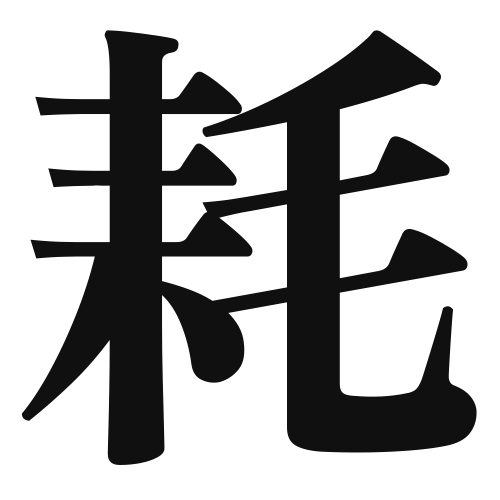1. Overview of Meaning
The kanji “耗” (pronounced “kou” in Japanese) generally means “to consume,” “to exhaust,” or “to deplete.” It conveys the idea of using up resources or energy over time.
2. Formation and Radical
Formation of the Kanji: The kanji “耗” is a compound character that combines elements to convey its meaning. It consists of the radical “毛” (meaning “hair” or “fur”) and the character “交” (meaning “to intersect” or “to exchange”). This combination suggests the idea of something being worn down or consumed through interaction.
Radical: The radical of “耗” is “毛,” which often relates to things that are fine or delicate, further emphasizing the idea of depletion or exhaustion.
3. Examples of Usage
Common Words and Phrases: Some frequently used words that include “耗” are:
- 消耗 (しょうこう, shoukou) – consumption, depletion
- 耗費 (こうひ, kouhi) – expenditure, waste
Example Sentences in Daily Conversation:
- このプロジェクトは多くの資源を消耗します。
(This project consumes a lot of resources.) - 彼はエネルギーを耗費しすぎて、疲れています。
(He has exhausted his energy and is tired.)
4. Synonyms and Antonyms
Similar Kanji: A kanji with a similar meaning is “消” (shou), which means “to extinguish” or “to eliminate.” While both kanji relate to the idea of depletion, “消” often implies a more immediate or complete removal, whereas “耗” suggests a gradual process of consumption.
Opposite Kanji: An antonym for “耗” is “蓄” (chiku), which means “to accumulate” or “to store.” This kanji represents the idea of gathering resources rather than depleting them.
5. Cultural and Historical Background
Relation to Japanese Culture: The concept of “耗” is significant in Japanese culture, particularly in discussions about resource management and sustainability. It reflects a cultural awareness of the importance of conserving resources.
Proverbs and Idioms: One relevant proverb is “無駄遣いは耗を招く” (Mudazukai wa kou o maneku), which translates to “Wasteful spending invites depletion.” This saying emphasizes the consequences of careless resource use.
